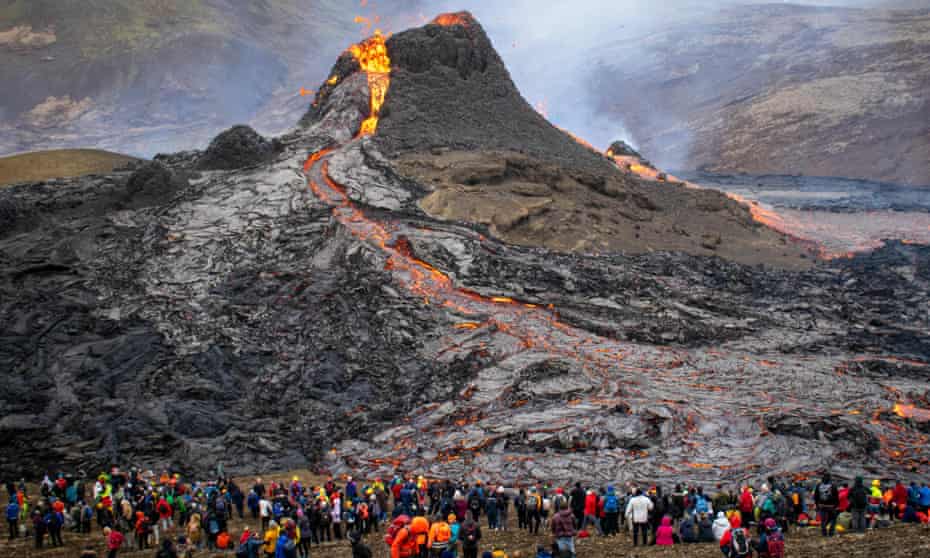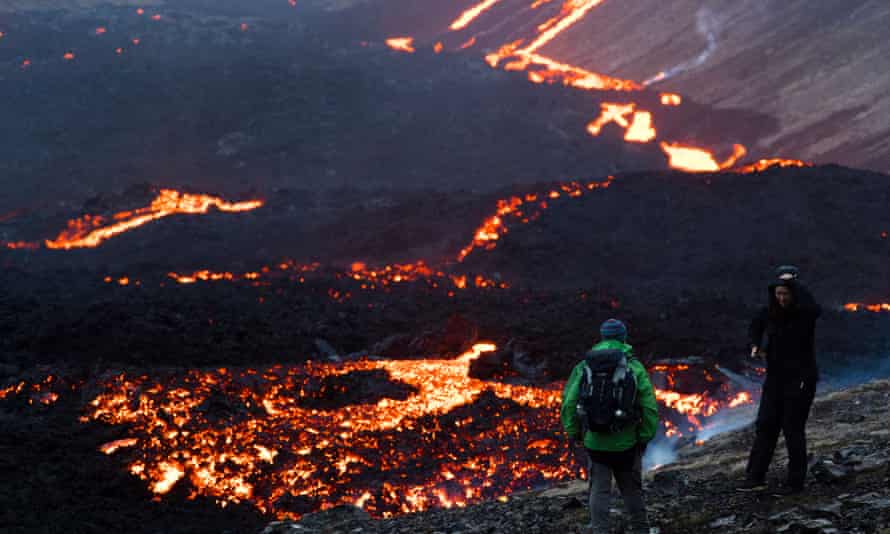Spectacular lava flow that drew hundreds of thousands of tourists goes quiet shortly after a record-breaking run

Agence France-Presse in Reykjavik
Mon 20 Dec 2021
Authorities in Iceland have officially declared the country’s longest volcanic eruption in 50 years over. The spectacle drew hundreds of thousands of tourists to witness its lava flows.
“It’s been three months since lava last came out, so this eruption is now considered over,” said Bryndís Ýr Gísladóttir, specialist in natural hazards at the Icelandic Meteorological Institute (IMO).
But the agency, which monitors volcanic activity, nevertheless called on hikers to be cautious, and it will continue to monitor the area.
The eruption of lava began on 19 March on the outskirts of Mount Fagradalsfjall, about 25 miles (40km) south-west of the capital Reykjavik.
Lava had not flowed for eight centuries on the Reykjanes peninsula, and for nearly 6,000 years where the eruption occurred, according to volcanologists.

The lava at Fagradalsfjall in June.
Photograph: Dave Stevenson/Rex/Shutterstock
But this eruption, the sixth in Iceland in the past 20 years, became the longest recorded in half a century as it spewed lava for six months.
Just after claiming that record on 18 September, the lava stopped emerging – but only after more than 140m cubic metres of magma had spilled into the valleys of Geldingadalur.
Relatively easy to access, the eruption became a major tourist attraction, with more than 350,000 visitors, according to the Icelandic Tourist Board.
Experts have warned that further eruptions in the area are possible. “History tells us that volcanic activity there occurs in cycles,” the IMO said.
Last week, the institute revised down the risk of an eruption of another Icelandic volcano, Grímsvötn, having raised the eruption alert level to orange two weeks ago.
The most active volcano in Iceland, erupting on average every five to 10 years, it sits in a less accessible area in the centre of the island, under a huge glacier.
But this eruption, the sixth in Iceland in the past 20 years, became the longest recorded in half a century as it spewed lava for six months.
Just after claiming that record on 18 September, the lava stopped emerging – but only after more than 140m cubic metres of magma had spilled into the valleys of Geldingadalur.
Relatively easy to access, the eruption became a major tourist attraction, with more than 350,000 visitors, according to the Icelandic Tourist Board.
Experts have warned that further eruptions in the area are possible. “History tells us that volcanic activity there occurs in cycles,” the IMO said.
Last week, the institute revised down the risk of an eruption of another Icelandic volcano, Grímsvötn, having raised the eruption alert level to orange two weeks ago.
The most active volcano in Iceland, erupting on average every five to 10 years, it sits in a less accessible area in the centre of the island, under a huge glacier.

No comments:
Post a Comment